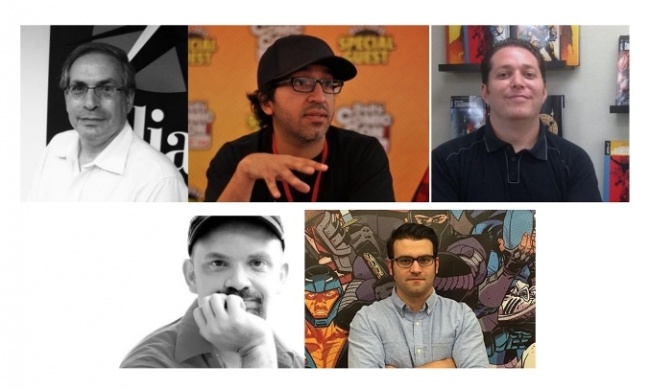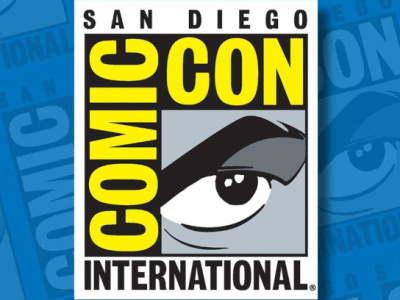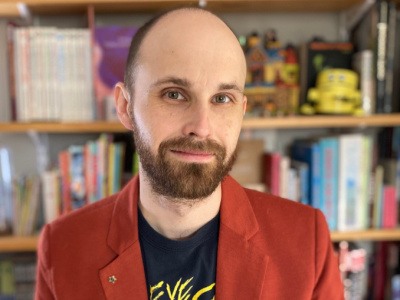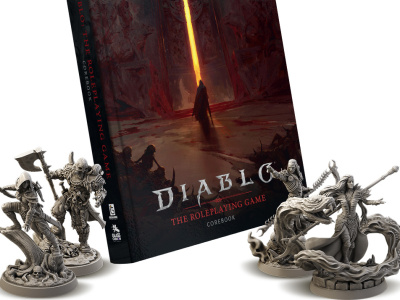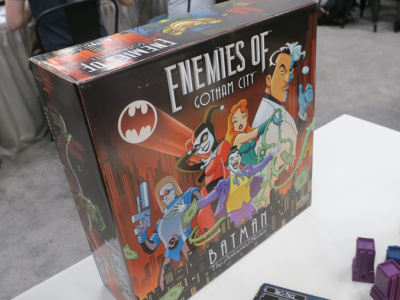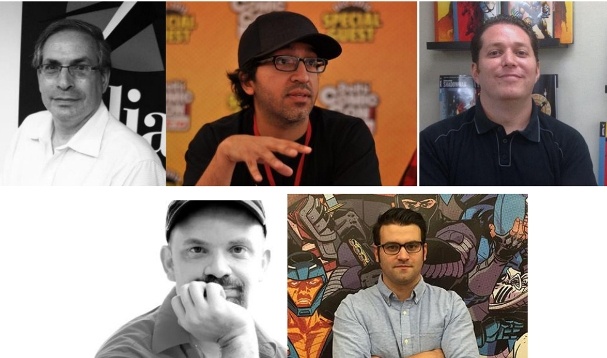
I'd like to get your impressions on right now the state of the two parts of the paper market. You're in the comic market and the book market, so whoever you want to jump in on that question, just to talk about the overall situation. Then we'll get into the Valiant part of it.
Fred Pierce: I see we're doing well, which makes me happy. I wish the retailers were doing a little bit better because when they're doing well with the other companies they have more money to spend on us, and when they do better with us, they have more money to spend on the other companies.
I think we've hit a bit of a lull, but then like most things in the industry I think it's temporary.
Dinesh Shamdasani: Yeah, I would agree with that. Valiant has had a very good year, so we're seeing things perhaps a little rosy, but the reports that we're getting are very strong, both in the direct market and the book market.
We speak to Diamond every day. They tell us they're opening new stores at record paces, and they seem to be very happy. We just put out a big new book in X‑O Manowar. The market took a huge position on it, which I think is a very good sign that the retailers are doing well from a cash perspective, and that they feel like the consumers are doing well from a buying perspective, so it looks healthy to us.
Hunter Gorinson: I would just add that on the mass market side, on the book side, we set a couple of internal records in 2016, which is another very healthy sign.
What are those? What were your big book format releases in 2016?
Pierce: Our Faith trade paperback was tremendously embraced by the industry and by the mass market. For us, it made a real statement on who Valiant can be in the industry.
Shamdasani: Faith, and also I would say deluxe editions.
Looking ahead now to 2017, and going back to the comic titles, comic format products, what do you plan as your production this year, in terms of number of titles? Is that going up, going down, or staying the same versus 2016?
Shamdasani: At best, it'll stay the same. We're probably going to shrink it a tad. Our focus in 2017 is a little different than our focus has been over the last five years. We feel like we've accomplished a number of our goals in direct market and mass market: build a company that has a strong brand, that has a strong consumer base, convince retailers that we're going to be here for the long haul, and that we produce a quality product.
We've done all those things, and now we want to focus very, very aggressively on sell‑through, and on increasing our consumer base so that the retailers can make a lot of money with our product. That's what we're going to be doing in 2017.
We're going to be doing a lot of big titles with huge, aggressive pushes on them, but not necessarily the same aggressiveness on quantity of product that we've been doing in the last 12 months.
Atom! Freeman: When you look at the solicitations, and we look at the huge FOC list every week that retailers are dealing with, I think what you see is that the smart money is to push out big titles, and spend a lot of energy pushing down on the smaller group.
It allows the retailers to actually get behind it, rather than have to continually make that Sophie's choice every week.
We suspect that once you get a new customer, they buy multiple titles across your line, so it seems like the biggest goal needs to be acquiring new readers. You mentioned that that was one of your goals for this year. What are you doing to make that happen?
Shamdasani: We're doing a lot, and the guys can talk about it. I just want to add one thing. What you say is very keen in our decision‑making for 2017. It's not just that we're going to bring in new customers and they tend to buy everything that we do.
It's that we want to make sure that we're not increasing the line to an extent where we're taxing their dollar, and we're taxing their time, so that they can feel like they can read everything that we do. That's something that's been with us from day one with the original Valiant as well.
Freeman: I think we've really set standards for the entire industry on how to deal with Direct Market retailers. They do not get a lot of support from publishers. Generally speaking, we lead the charge in interactions with retailers, finding out how we can customize with them.
Also, in our POP, and our promotional items that we put into stores, we far and away lead the entire industry on that. That's because we see the value and how difficult it is for comics retailers to push through that sell‑through.
We're actually about to transfer into a campaign that is focused entirely on selling through on a book that we're still weeks out from shipping. No other publisher, I think, in comics is doing that right now.
Pierce: Also we're very hands‑on with the retailers. We understand that we need to make sure that they, their managers, and the people on the floor know how to sell the Valiant books. We'll send them cheat sheets on, "This is a Valiant title. If you like this genre of entertainment, this title makes sense." A lot of our best success has been when the sales guys and women go into the store and they speak to the individual hand sellers about what we're doing.
Gorinson: From a publishing standpoint, I would just credit both Dinesh and Warren here with, on the consumer side our approach to choosing what titles we publish is twofold. On one hand, we want to set some of our biggest and most well‑known characters up in a way that we can assign some high quality talent to them, and put a really intriguing concept behind it.
At the same time we're also trying to get some new concepts out into the market. The success of Britannia, I think is a phenomenal example of that, a historical fiction title about Ancient Rome that I don't think anyone would have anticipated Valiant would be publishing, two or three years ago.
Then something completely out of left field with a massive creative team like the upcoming Secret Weapons book, with an Oscar nominated screenwriter who is up for Arrival and a really, really phenomenal artist in the form of Raul Allen.
Talk a little bit about some of the side titles, versus the core universe. How is that evolving in terms of a percentage of your emphasis and publishing line?
Shamdasani: We've seen a big opportunity that we want to take advantage of. We experimented with Divinity. We liked the title. We liked the premise, and we thought we'd expand the core characters of Valiant with a superhero archetype done in a slightly different way.
The tremendous success really emboldened us to create new IP, to create new characters, to push the boundaries of what the Valiant universe can be. As Hunter points out, we did a book that takes place in Nero's Rome about a legionnaire, a detective; something you'd never seen from Valiant before and would never think that Valiant would produce.
Then we just did a book about a child lost on a mysterious island full of dinosaurs, another book that is very much a genre that you wouldn't expect to see at Valiant.
We did that a lot in 2016, Faith, Gen Zero, Britannia, Savage, Divinity II and Divinity III, two sequels to the first mini‑series. 2017 is a reemphasis on our biggest characters, and X‑O Manowar leads the charge there.
Warren Simons: One of the keys which I think is so refreshing is that we have extraordinary freelancers who really treat the books as the most important thing that they're working on. We obviously have an incredibly talented group here of writers, artists, and the entire team itself, internally, but externally we have a bunch of guys who are now looking at this as the fourth or fifth most important thing that we're working on. We have guys like Matt Kindt, Peter Milligan, Clayton Henry, and Tomas Fiorello, who are really putting their hearts and backs into the books.
I feel like they really feel like they're making a piece of art here; commercial art, but art nonetheless, as opposed to churning out something that needs to be cranked out on a 22‑day schedule, which is the fourth title that they're working on in the same family.
I think that plays a big role as well.
What are the jumping on points for X-O Manowar? Is there more than one, or is this it this year and retailers should just focus down on this one month?
Shamdasani: We put 13 issues into production well before we even announced the book. That was with five different artists, and we built three issue arcs that allow us to build a new jumping on point for readers as they hear about how good the title is.
We're being a little cocky here, but we think it's a great book. As they hear about how good the title is and want to jump in, they'll have an opportunity every three months. We're going to be doing huge, aggressive marketing pushes, advertising pushes on those new jumping on points.
Each one will have a specific high concept that hopefully will get people excited, a brand-new artist that's a big‑name artist from our stable that will get people excited.
We've built up our variant programs to be very small, concise, and targeted so that people can take a look at the variants and decide up front what they want to get, and not feel overburdened by having to buy too many books in order to collect it all. That hopefully will help the retailers through the collectors coming in.
Then we've got the trade paperback program, which is all priced at $10, every trade for X‑O Manowar. Again, focused on readers, and we're going to match the trade release schedule with the new arcs, again to help people be able to jump in. If you want to jump in at issue four because you've heard how great the book is, you can come in and for $10 buy the trade for one, two, and three, and issue four for $3.99, and you're all set.
Oh, so the trade collecting the first three will be out when number four comes out?
Gorinson: Yes. We actually have not announced that yet, but we will be going into that in more detail at ComicsPRO for sure.
Pierce: We're going to make it as easy as possible to come in. You don't have to have read any Valiant book to read the new X‑O. This will be a major jumping on point for the universe as well. That's the point of this new book.
Gorinson: As I'm sure you know, there's a ton of noise out there in the marketplace right now and a bunch of titles coming out. No doubt about that, probably more titles being produced monthly right now, at a higher quality than at any other time in the history of comics.
The entire publishing plan for X‑O Manowar is built around a way to maximize momentum and maximize enthusiasm amongst the readers of the series and amongst comic fans at large, so that every three months we're getting a new jumping on point for the series with an A‑class creative team, and really providing a sense of forward momentum across a year's worth of storytelling in comics, which frankly is not something that you see really going on from any other publisher right now.
There's not a sense that books are going to be around for a long time. Long‑form storytelling is kind of a rarity right now, so that's an exciting opportunity that we have right now.
Shamdasani: That's not to say that we haven't built a long‑term narrative for X‑O Manowar. We've got more than 13 issues in production now, but when we announced that we have 13 issues in production, that is a long‑form story that we're telling with X‑O Manowar.
Pierce: I think accessibility is something that's a foundational element of what Valiant tries to do. We try to build every issue to be an accessible jumping on point; every arc, every book.
Continuity is extremely important to us. It's also a cornerstone of our universe. We try not to build a book to be impenetrable, so that you can hand a book to somebody who has never read a comic before, and they can have an understanding of what's happening here. I think it's those two things are a combination which is a foundational component of our line.
Click here to go to Part 2.



